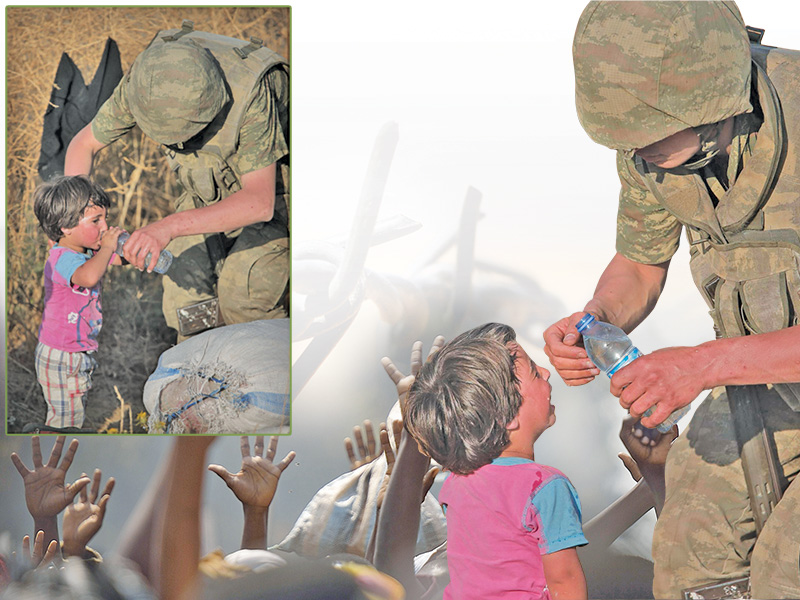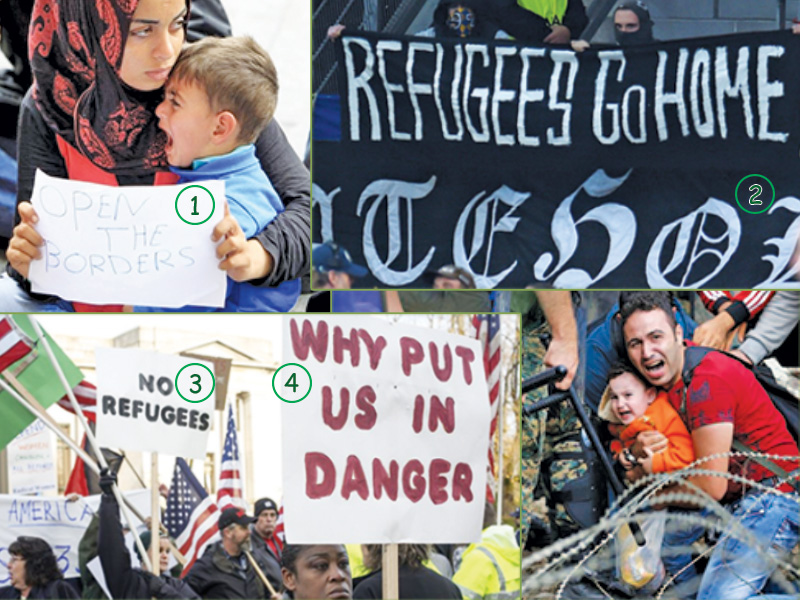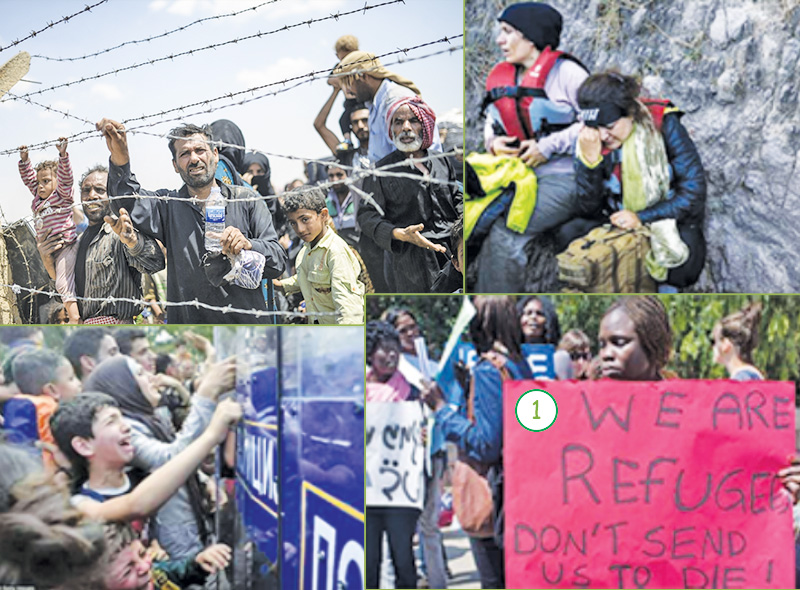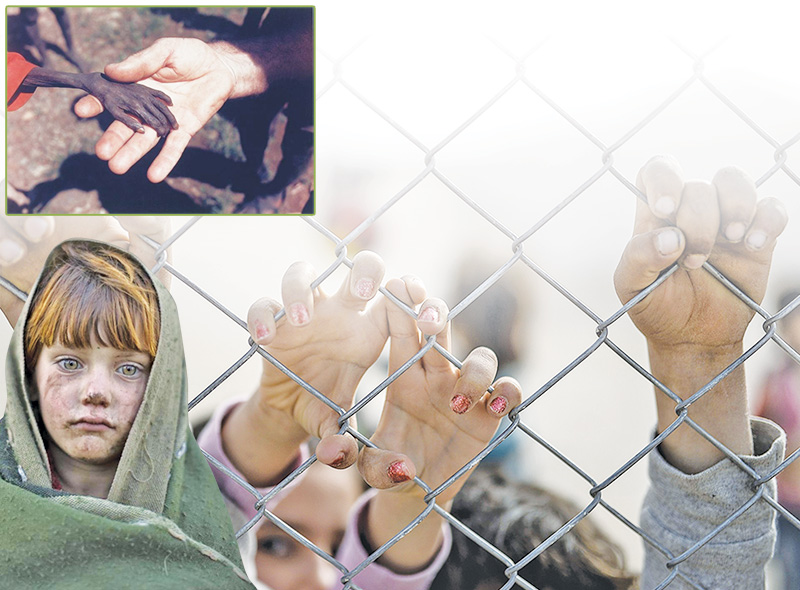 |
How should Muslims behave toward refugees?
What will it benefit Muslims to assist refugees?
According to the United Nations, there are some 50 million refugees in the world, and Muslims constitute a large portion of these. Due in particular to colonialist countries' desire to take control of the rich resources of Islamic lands, over the last hundred years millions of Muslims have abandoned their land, homes and jobs and have had to seek refuge in neighboring countries, living in camps under very harsh conditions. Other peoples have then moved into the lands that were abandoned due to war, violence and occupation. Today, for example, a full one-third of the Palestinian people are refugees. Indeed, the great majority of those living inside Palestine have also had to leave their homes and live in camps. There are hundreds of thousands of refugees, including large numbers of Iraqis following the American intervention, Rohingyas who had to abandon their homes due to oppression in Myanmar and some 2 million Afghans, Kashmiris and Somalis. Today, too, hundreds of thousands of refugees are abandoning their motherland in Syria.
In the first years of Islam, when maltreatment and oppression became unbearable, our Prophet Muhammad (saas) migrated with his Muslim followers to Medina. These Muslims who migrated from Mecca to Medina were known as 'Muhajirun,' (migrants). The Muslims of Medina welcomed the Muhajirun in a very graceful way. These Muslims of Medina who sheltered the migrants and helped them in all ways were known as the 'Ansar' (helpers.) God reveals that He will be pleased with both of these of believers:
Those who have faith and have emigrated and strived in the Way of God and those who have given refuge and help, they are the true believers. They will have forgiveness and generous provision. (Surat al-Anfal, 74)
The Muslims who our Prophet (saas) referred to as "Ansar" or helpers consisted of believers from Yathrib who had gone to Mecca during previous pilgrimage seasons and secretly sworn allegiance to Rasulullah (saas) or who had embraced Islam by the preaching of Muslims that had sworn such allegiance before. They had accepted Islam later than most Meccan Muslims, but like them they were virtuous, honest and altruistic. These worthy people regarded the Muhajirun who sought refuge with them as brothers, shared their homes and food with them and exhibited exemplary moral values. God describes the moral virtues of the Ansar as follows:
 |
The compassion shown by Turkish soldiers since the beginning of the refugee crisis is an important example of the morality of Muslims. |
Those who were already settled in the abode [Medina], and in faith, before they came, love those who have emigrated to them and do not find in their hearts any need for what they have been given and prefer them to themselves even if they themselves are needy. It is the people who are safe-guarded from the avarice of their own selves who are successful. (Surat al-Hashr, 9)
These moral virtues of the Ansar were instrumental in many good deeds, and Islam spread swiftly across the world, not just in Medina. God describes the migrants and the virtuous Ansar who helped them thus in Surat at-Tawba:
The forerunners – the first of the Muhajirun and the Ansar – and those who have followed them in doing good: God is pleased with them and they are pleased with Him. He has prepared Gardens for them with rivers flowing under them, remaining in them timelessly, forever and ever. That is the great victory. (Surat at-Tawba, 100)
The moral virtues of this community whose altruism, love, affection and compassion are praised in the Qur'an must serve as a role model for all Muslims, and must be applied in the case of today's migrants.
 | |
1.Open the Borders | 3. No Regugees |
It is great unscrupulousness to compel oppressed people, who were forced to flee their homeland, to return back to an environment of war due to the offensive behaviors of some provocateurs. In the Sight of God, the sin of such remorselessness may be very great. | |
Listening to arguments about Syrian refugees, hearing that these innocent people want to return to the climate of conflict because of the unpleasing attitudes of some provocateurs and seeing the despairing expressions on the faces of those kept waiting at border crossings of course distressed us all. Remember that many of these people had professions, cars, homes and resources of one kind or another; yet the oppression in Syria is so terrible that they had to migrate and flee to a neighboring country in fear of their lives. They preferred being refugees to being bombed, raped or beaten to death with truncheons. They sought refuge in our lands to protect their families, without thinking about their lives they worked so hard to build over the years.
Thinking of our relations with these Syrian brothers solely in terms of politics or the national economy, hiding behind such concepts as "conjunctures, geopolitics and realpolitik", issuing disturbing statements will result in a tragedy in the name of humanity. As with everything in our lives, we must also consider this state of affairs within the framework of Islam's morality, think in a rational and conscientious way and act accordingly.
 |
1. We are Refugees Don't Send Us to Die! |
These oppressed people, rendered vulnerable and desperate, only aspire to save their lives and do not wish to return to war-torn land. Being indifferent to such supplication is great remorselessness. |
God reveals in the Qur'an how Muslims must behave when they encounter defenseless people, or the Muhajirun, who are persecuted by cruel rulers:
What reason could you have for not fighting in the Way of God – for those men, women and children who are oppressed and say, 'Our Lord, take us out of this city whose inhabitants are wrongdoers! Give us a protector from You! Give us a helper from You!'? (Surat an-Nisa', 75)
This verse commands Muslims to immediately offer assistance to oppressed men, women and children. Through this verse, God imposes a responsibility on Muslims to help all oppressed people, irrespective of their race, faith or sect.
Not to share one's food, water, home and other means with these innocent people, refusing to help the needy and thinking solely of one's own interest is wrongful behavior condemned in the Qur'an. It is also commanded in the Qur'an that the "very poor and travellers" should be helped:
Give your relatives their due, and the very poor and travellers but do not squander what you have. (Surat al-Isra', 26)
 |
Helping vulnerable people in need of help is a part of being human. However, it is, above all, a command of the Qur'an. |
As we have seen, travellers are a group of people requiring priority assistance in the view of the Qur'an. Being a refugee means being a traveller, being on a journey with no home and no food.
As required by Islamic moral values and good conscience, we too must exhibit the virtues of our Prophet (saas) and the Companions and welcome others in the same way as the Ansar. We must consider our Syrian brothers before ourselves. We must first provide them with food, drink, warmth and place to sleep, and we must avoid any behavior or speech that might distress them.
Migration is an excellent opportunity to exhibit moral virtues, not only for those who lived in the time of our Prophet (saas) and the Companions, but also for those believers who came later. The important thing is the moral growth, maturity of faith and virtuous morality that occurs during that migration, rather than its form. All believers in all times and places can live by that spirit.
 |
As for those who have faith and do right actions, |